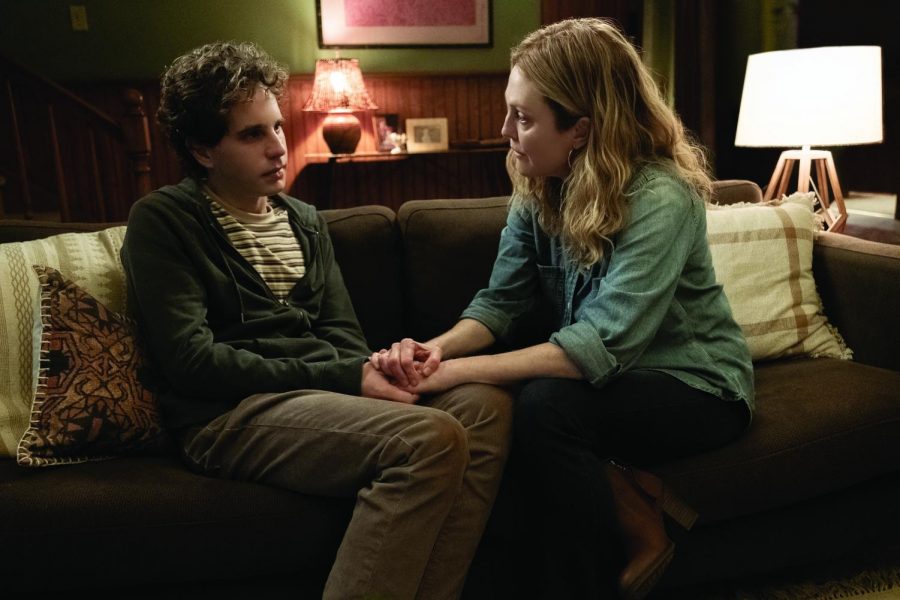“Dear Evan Hansen” can not recapture stage magic
Film critic Hunter Friesen says “Dear Evan Hansen” is “misguided but not without its merits.”
Sep 23, 2021
Besides the expected superhero films, the genre that seems to be all the rage in 2021 is musicals. This year sees several different variations of the movie musical, featuring original concepts (“Annette”), musical variations of classic tales (Amazon’s “Cinderella”), Broadway adaptations (Lin-Manuel Miranda’s “In the Heights,” and Miranda’s directorial debut “Tick, Tick… Boom!”), and even remakes of Broadway adaptations (Steven Spielberg’s “West Side Story”). Slotting right in with the rest of the Broadway pack is the film adaptation of the modern stage musical sensation: “Dear Evan Hansen.”
Riddled with social anxiety, depression, and a cast on his left arm, Evan Hansen is a teenager who can never seem to fit in. He writes letters to himself for motivation, in which one haphazardly falls into the hands of the troubled Connor Murphy, who takes his own life shortly after. The Murphys believe the letter to be Connor’s suicide note, with Evan being his best friend. Rather than admit the truth that Connor was his bully, Evan goes along with this opportunity, netting him a newfound sense of popularity and affection from those that never once passed him a glance. He also becomes an unofficial member of the Murphy family, with the parents taking him under their wing and their daughter, Zoe, developing a relationship with him. But like all charades, the lie begins to spin out of control, tangling Evan and those he cares about in a web of deceit.
Tasked with bringing the stage play to cinematic life is director Stephen Chbosky, who recently had success with “Wonder,” about a boy with facial disfigurement, and the soon-to-be cult classic/greatest movie ever according to Tumblr, “The Perks of Being a Wallflower.”
Unlike the musicals mentioned in the beginning, “Dear Evan Hansen” doesn’t feature large group numbers on sweeping sets. Much of the action occurs in smaller, domestic locations, with the most exotic sets being a school gymnasium and a run-of-the-mill apple orchard. And even when a song features more than one performer, they hardly share the same location, such as “Requiem,” where the Murphys are crosscut and folded on top of each other.
The film hangs its heart on the musical numbers, many of which have become anthems to a generation, especially “You Will Be Found,” which has become so iconic that it gets a special Sam Smith treatment during the credits, along with the familiar show-stopping rendition that occurs at the midpoint. Schbosky shows middling prowess for the staging of these numbers, opting for the actors to sing live, filming them through extended takes and slower camera movements that accentuate the emotional pull of the material. That stillness also acts as a double-edged sword, as there is a distinct lack of energy that makes the 137-minute runtime feel a lot longer than it is.
Ironically, the main problem that keeps this version of “Dear Evan Hansen” from being a sensation is not the cinematic qualities, but the story itself, which won Best Book of a Musical at the 2017 Tony Awards. The problem with the story is systematic, with Evan’s actions being steeped in selfishness. Screenwriter Steven Levenson, adapting his own material, tries too hard to have his cake and eat it too as he attempts to scorn Evan’s actions while also finding the silver lining with a ploying message about friendship and grief. The stage may have been able to cover this with its overpowering emotional tunes and acting, but the slowness of the film adaptation allows for that problem to fester until your sympathy for Evan has completely dried up and you just want him to get caught.
Fortunately, the actors aren’t too affected by the script’s problems. Reprising his famous role, Ben Platt proves once again that he was born to play Evan Hansen, despite his 27-year-old face and gangly body signaling that he should have stayed retired.
Kaitlyn Dever, who broke out in 2019 with “Booksmart,” often steals the show as Zoe. Dever finds the right amount of vulnerability as her character deals with the death of a brother she never had much respect for. She and Platt make their relationship seem believable, despite the glaring age difference and underwritten romantic development.
Overall: 3/5
Misguided, but not without its merits, “Dear Evan Hansen” aims for the heart with pinpoint accuracy. There’s an emotional and sweet lesson buried under the creepy candy coating that is the central premise. Once that obstacle is overcome (which is a big task), then there are enough powerful songs to connect with those that sometimes feel alone.



















